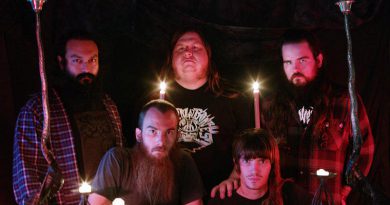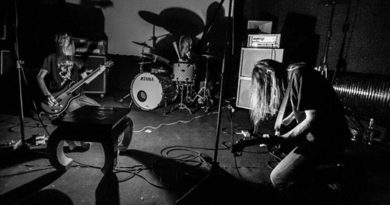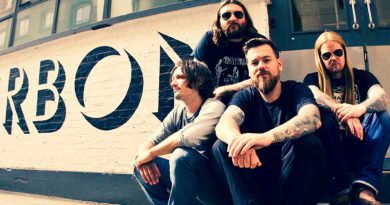In Search Of Tone: Jeff Caxide Of ISIS, Red Sparowes & Palms
Rock ‘N’ Roll High School. That was going to be our radio station back in 9th or 10th grade. My buddy Erik had a great idea about a school radio station to play good music and I was too shy to talk on air. Sorry Erik. Jeff Caxide, bassist of ISIS, Red Sparowes, and Palms, thanks us at the end for the chat because he hadn’t thought about a lot of this in a while, but thank you Jeff for making Rock ‘N’ Roll High School a reality for a short time.
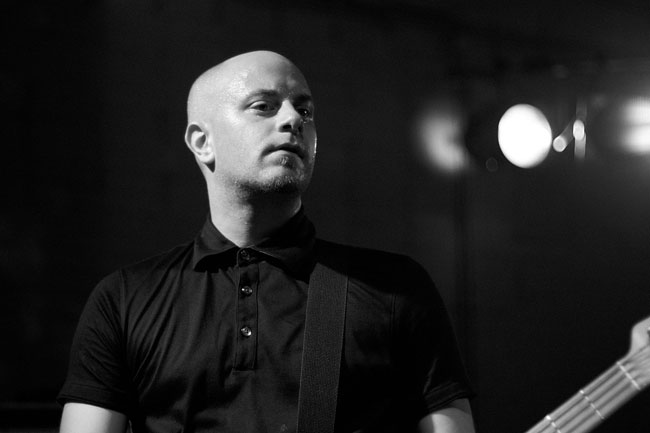
Although the fanboy in me took over the interview, Erik got a few questions in. Weird how I wouldn’t talk in High School and now I won’t shut up. Jeff was very cool to talk to and had a lot of valuable information to share. I loved the bands before but gained a new appreciation for the music afterward.
Josh: Hey Jeff nice to meet you. I’m Josh and this is my buddy Erik.
Jeff: Thanks for having me and nice shirt Erik [referring to his Faith No More shirt].
Erik: Thank you [laughs].
Josh: We’re both big fans of Red Sparowes, Palms, and ISIS so this was a cool experience to interview you while he was here on vacation.
Jeff: Yeah awesome. I’m a bit out of the loop on interviews and such, but Aaron Turner vouched for you and that’s big [laughs].
Josh: Wow, that’s amazing! Made my day. Before we dive into everything bass, I recently read you play a little guitar as well?
Jeff: Yes, a little bit. I was in a band in Connecticut called Cable, I don’t know if you guys are familiar with that band. My plan was to switch from bass to guitar after that and even bought a guitar, but I wasn’t very good, and I never really could fully wrap my head around it as much as I can with the bass. I do play a little bit and I did play a little guitar on the Palms record. In fact, I played all the guitars on the last song on that record, and I played on a couple of Red Sparowes songs.
I have my Music Man Bass, I did everything from Oceanic onward on that…
At that time, I was going back-and-forth between LA and Asheville. I had a girlfriend at the time living in Asheville and while I was away, Red Sparowes would still practice and when I would get back, they would say well this song doesn’t really need two bass guitars because Greg [Burns] was playing bass as well. I just picked up a guitar and played some chords over it. Since I’m not a proficient guitar player, I’d throw a bunch of effects on it, and it sounded cool [laughs].
Josh: [laughs] Yes, my wife has a bass guitar and I’ve tried playing it, but I just don’t understand it. It’s definitely very different than the guitar in many ways. What bass guitars do you have?
Jeff: I actually only have two. I have my Music Man Bass, I did everything from Oceanic onward on that and then I have a Yamaha that I inherited from Josh Graham. That’s what I recorded the Red Sparowes stuff with and those are the only two bass guitars I have. I had a Sage back up which was from my friend’s company back in Connecticut. It’s a cool bass but not really my style. It’s a little too light and the neck was a little too long for me, but it was suitable for a backup if I broke a string or something. I think I made some noises with it on In The Absence Of Truth. Some string scratches or something, but I never played it on a song on the record.
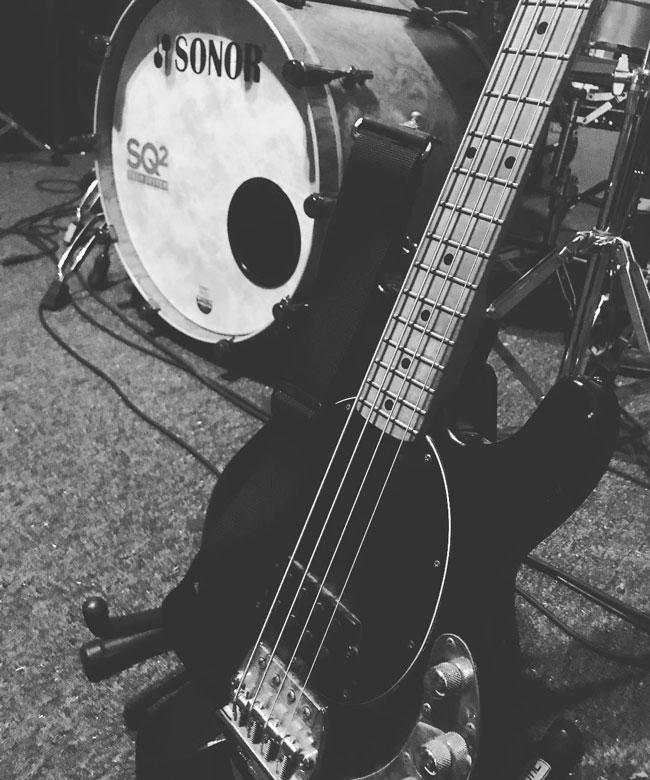
Josh: What are some of your favorite amps you have used?
Jeff: I recorded the last album Wavering Radiant with Aguilar who I had a sponsorship from. I think it’s a DB 750. I don’t know, all my gear is in the corner of my room just collecting dust [laughs]. I had an 8×10 Agular and a DB 750. Before that, I just used a standard Ampeg Tube Amp 8×10. I think those sound great, but Aguilar wanted to give me free shit and I never heard of them before to tell you the truth.
Josh: Do you use a large pedalboard with various effects on bass or use the tone from the amp?
Jeff: I’m a pretty big pedal fan. I have an EQ and I use a Pitch Shifter to get my chorus sound. I got that sound by accident one day by just messing around with the pedals. I thought ‘this sounds kind of like The Cure’ so that would be my setting for the Pitch Shifter. I have two Delays, a Reverb, a Tremolo, a Flange, and two different Distortions and I added a Line 6. And when we recorded Wavering Radiant with Isis, Joe Barresi [recording engineer] gave me a real hard time about my Boss Flanger pedal, he gave me shit every day to the point he convinced me to get rid of it.
Josh: Flangers get a lot of hate.
Jeff: Yeah, they do, and specifically the Boss Flanger, he hated it and I don’t even remember why because it was 11 or 12 years ago now [laughs]. I remember he said stop playing that and try this pedal and it’ll sound so much better, and he was right. You listen to Joe Barresi when he makes a suggestion [laughs].
Joe Barresi gave me a real hard time about my Boss Flanger pedal, he gave me shit every day to the point he convinced me to get rid of it…
Josh: Moving on to songwriting a little, I feel each project I’ve listened to that you’re a part of is equally outstanding.
Jeff: I agree [laughs].
Josh: [laughs] What is your writing process like for each of these bands?
Jeff: I’d say it’s pretty similar throughout. ISIS was pretty democratic, which I think ultimately brought the band down. Aaron [Turner], Cliff [Meyer], and I were the main songwriters and Mike [Gallagher] wrote a lot too. I guess we were all songwriters and we all wanted to be the guy with the final say, maybe, I don’t know. But it was very democratic, and people would pick apart other people’s parts.
When we got to LA, Cliff and I started Red Sparowes with Josh Graham and we had a whole album ready in three months. It was such an easier process. I don’t know why; it was the same process, but the songs just came together a lot more. Also, when we came to LA, I was much more outgoing on songwriting. On Celestial and Oceanic, I had a couple of riffs here and there that I wrote but Panopticon and Red Sparowes, I wrote a lot of that stuff. I became a lot more confident as a songwriter and my ideas with Palms, it was really just myself, Cliff and Aaron Harris and in a room together and I wrote a lot of foundation of that record as Cliff is really good at painting over someone else’s foundation, or as my bass playing is almost like a guitar, I was trying to fill the space with Cliff playing over the top.
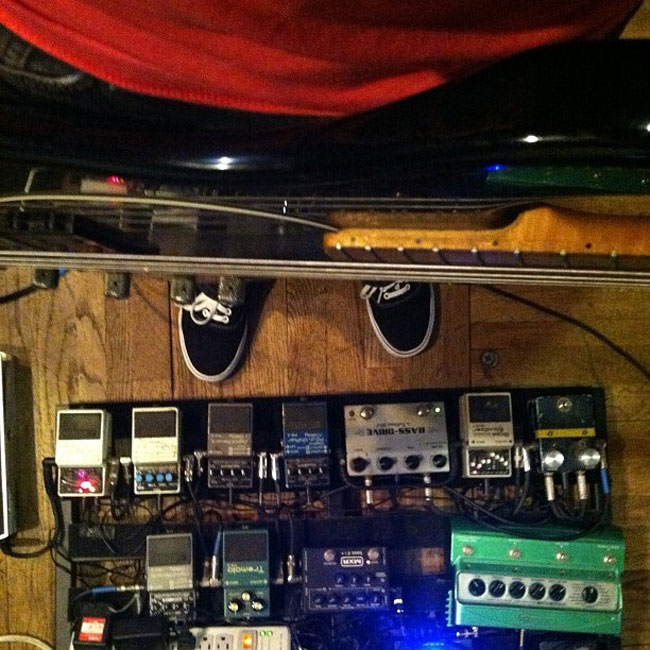
The songwriting is pretty much the same for all the bands, which helps as they consist of a lot of the same players, I’ve been in three bands with Cliff and two bands with Aaron Harris, so we knew each other pretty well. That dynamic for Palms changed a little bit when Chino Moreno came in for tours and played guitar. We wrote some stuff together and he definitely had some opinions, some I agreed with and some I didn’t [laughs]. Some bands are dictatorships, and some are democracies, oddly enough I think the dictatorship bands are ones that I like better.
Two of my favorites are Swans, where it’s Michael Gira’s band, and Afghan Whigs where Greg Dulli is in charge. Afghan Whigs is his band, he writes the music, everyone else sort of adds to it but he’s got the final say. Those are the bands that seem to last longer and be more cohesive. Like I said, towards the end of ISIS it became so democratic that to get to a point where everyone is happy was like treading water. On the other hand Godspeed You! Black Emperor has about twenty members with no real leader, so I guess it depends on the people you’re with too.
I find it best to double what the guitars are doing, maybe add a little something, but in the quieter parts, you have more space to move around and be experimental…
Josh: Very interesting, when writing bass riffs how do you come up with something that meshes so well within the song? I’ve tried but all I can come up with is doubling the guitar [laughs].
Jeff: Well, let’s say Turner shows me a riff on guitar. I’ll learn it the way he’s playing it and I’ll play it the same as the guitar parts. As practice goes on, little opportunities will present themselves to where I can change things up, especially during quieter moments. If there is heavy riffing, I find it best to double what the guitars are doing, maybe add a little something, but in the quieter parts, you have more space to move around and be experimental or just shine a little bit more. I would always start basic with what Aaron and Mike are doing and try to complement that, and then sometimes Cliff will pick up a guitar, instead of the keyboard, and they’ll be three guitars doing stuff at once, and then it’s just my job to hold it down and not add to the chaos.
Josh: I have many off days and was curious what you do if you’re having one?
Jeff: That happens all the time, I remember coming up with an awesome part at practice and the next day, it’s like what happened! [laughs]. There are days I’ll pick up an instrument and just say ‘I don’t know how to play this thing, I can’t write anything, nothing cool is coming out’. That’s going to happen to everyone. I remember being 14, reading about Sting‘s new album and him talking about having massive writer’s block and having a hard time even making the album. This is Sting, one of the most prolific songwriters of all time, leader of The Police, one of my favorite bands of all time, and even he goes through this.
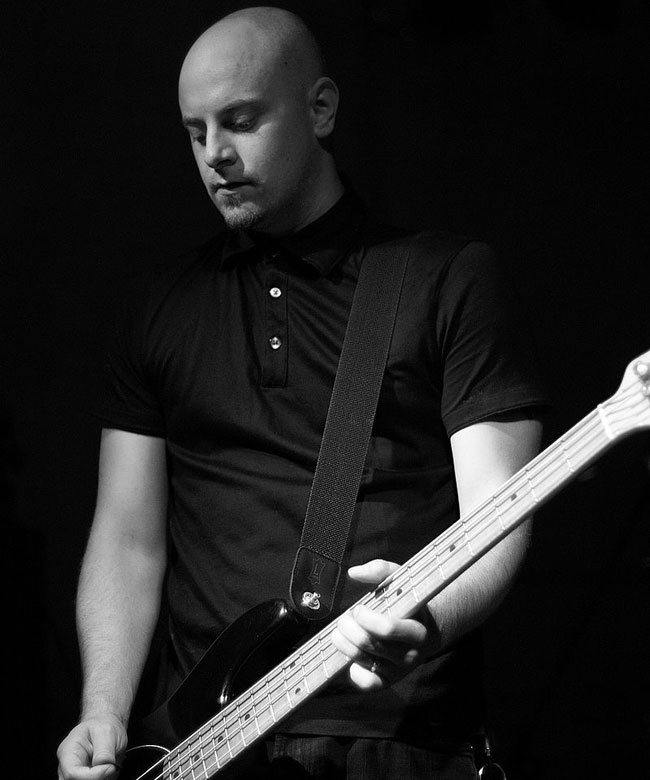
Josh: My buddy here is a fairly new bass player. What advice could you give him and other new bassists?
Jeff: Listen to your favorite bands over and over and over and over again, and just say I want to play like that guy. It took me until Panopticon to realize that Simon Gallup from The Cure is my favorite bass player. But oddly enough I wanted my bass to sound like Robert Smith‘s guitar, or maybe a combination between Smith‘s and Gallup’s tones.
We had just moved from Boston to LA, but I didn’t want to move to LA [laughs]. Like I said my girlfriend lived in Asheville, NC, so being the depressed mid 20s guy that I was, I was listening to Disintegration all the time. It really affected how I played, I didn’t have anything else to do so I listened to The Cure and played the bass. The more I played, the more it sounded like stuff on Disintegration in the early days. Erik, you have that Faith No More shirt on, they are one of the reasons I started playing bass. The Real Thing is a great bass album and they’re a great bass band. Billy Gould is a great bass player and has a strong bass presence.
It took me until Panopticon to realize that Simon Gallup from The Cure is my favorite bass player…
Erik: Yeah, he’s really good.
Jeff: It’s embarrassing to say, but Red Hot Chili Peppers The Uplift Mofo Party Plan and Mothers Milk was out when I was picking up a bass, and despite what you think about the chili peppers, Flea is an incredible musician. I didn’t try to emulate his slap pop-funk, but his presence in the band was strong, a lot of bands from punk don’t really have a strong bass presence. Another band is the Descendants, I really love them. Anyway, I’m getting really off track, just listen to your favorite bands over and over. That’s about it. I never learned any theory or anything like that. That’s one way to do it, if you want to be a real musician and play with your bass all high up and shit [laughs].
Erik: [laughs] ok thank you.
Josh: Is there a song or part of a song you’re proud of?
Jeff: Weight on Oceanic is one of my favorite moments as far as my playing. Also, In Fiction from Panopticon, coming up with that was really a turning point in my writing. I’m really proud of that record too. That’s when people start saying that sounded like The Cure and that made me really happy. I love the way my bass sounds on Wavering Radiant. Joe Barresi captured my bass sounds so well and I think I played really well. I maybe would fix the effects. I overdid it and I think every part has an effect on it [laughs].
For the Palms record, I’m really proud of the bassline on Tropics. It’s kind of the lead part of that song, which is cool. I would say there’s very little I’m ashamed of. Maybe some of the early stuff [laughs]. Before ISIS, they compiled all the Cable songs, put it out on vinyl and I said, ‘shoot me in the face’. This is the most embarrassing thing ever [laughs]. My playing is complete garbage at 17 in High School, I didn’t really take it that seriously and that’s the only thing I’m embarrassed of, not the band Cable, but my recordings with the band. They are abysmal [laughs]. They’re a good band though but as of a year ago, they’re not together anymore.
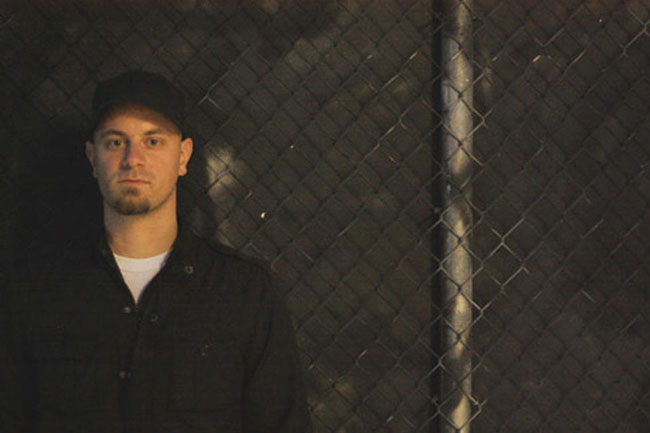
Josh: What are you listening to for enjoyment?
Jeff: My girlfriend and I just took a road trip out to Texas. 20 hours there and 20 hours back. I mostly listen to podcasts, but I did listen to the new Quicksand album a lot.
Erik: Yeah, that’s a great album.
Jeff: That’s a great one isn’t it! That’s weird, the two albums I love the most this year are bands I listened to in High School who broke up for a while and are now back doing stuff. It’s Quicksand and the new Iceburn album. I don’t know if you’re familiar with Iceburn but they were on Revelation Records in the 90s, but it was primarily a hardcore label and they kick-started the Youth Crew movement with bands like Judge, Youth Of Today, and others that became Quicksand, Burn and Orange 9mm.
Erik: Oh yeah Orange 9mm! I was just telling Josh the other day to listen to them.
Jeff: Their first four song EP on Revelation was fucking fantastic. I hate everything else after that but I’m that guy. The first thing is good and everything else sucks [laughs].
In the 90s, Revelation took a real left turn, put out experimental stuff like Iceburn, they put a four-song album from them that’s like an hour and fifteen minutes long and very Mahavishnu Orchestra influenced. They also put out Engine Kid, where Greg Anderson from that band would go on to start Southern Lord and form Sunn O))). It was a trip meeting him in Sunn O))) because I said ‘man our old hardcore bands played together’, I was in Cable, and he was in Engine Kid [laughs]. I wouldn’t think that Quicksand and Iceburn in 2021 would be putting out my favorite records.
It was a trip meeting him in Sunn O))) because I said ‘man our old hardcore bands played together’, I was in Cable, and he was in Engine Kid…
Other than that, I listen to a lot of soundtrack music, and I like Christian Fennesz. Oh, I’ve been listening to Coil a lot. Unfortunately, both members are dead now, but they have tons of tons of music and a lot of it’s very different from record to record. All of its very weird. I tend to gravitate towards weird. I’ve also been listening to Neurosis Through Silver And Blood a lot recently because I listened to a podcast about it. That broke it down over about six or seven episodes and listening to it again after all these years it’s still so amazing. Not one flaw on that record.
Josh: I love that album! Well, I’ve sort of taken over completely on this interview, sorry Erik. Did you have any questions for Jeff?
Erik: Yeah, you kind of took the reins on this one [laughs]. I guess my question would be where would you recommend I start with playing the bass? You mentioned to just listen to what you love and try and learn it. Do you suggest lessons or anything?
Jeff: Start a band with people that are way better than you and just try to act like you know what you’re doing [laughs]. That’s what I did. Play with your fingers at first because people will think ‘oh he knows how to play’ [laughs] ‘Fake it till you make it’ that’s LA’s slogan.
Erik: It’s New York’s too [laughs].
Jeff: Oh yeah true, but people in New York are better at spotting a phony than LA, I would imagine [laughs].
Josh: Thank you for your time it was really awesome getting to talk to you with Erik here as well.
Jeff: It was great talking to you guys. This was a lot of fun and I haven’t thought about a lot of the stuff in a while. Thank you this was cool.
Interviewed by: Josh Schneider

